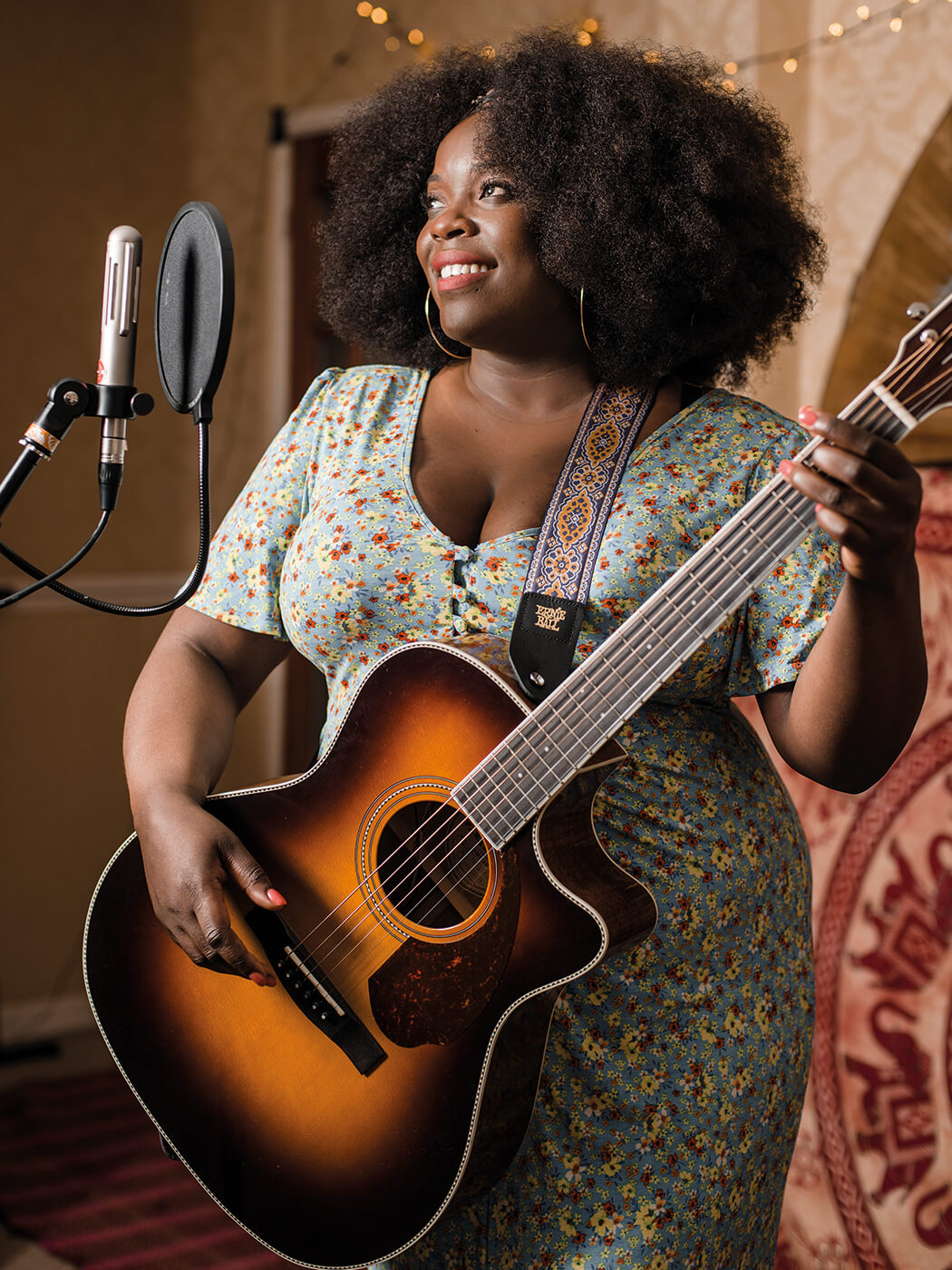Yola on her journey from homelessness and poverty to writing an album with Dan Auerbach
The singer-songwriter on privilege, toxic band environments and why picking up a guitar helped her finally get the songs out of her head.
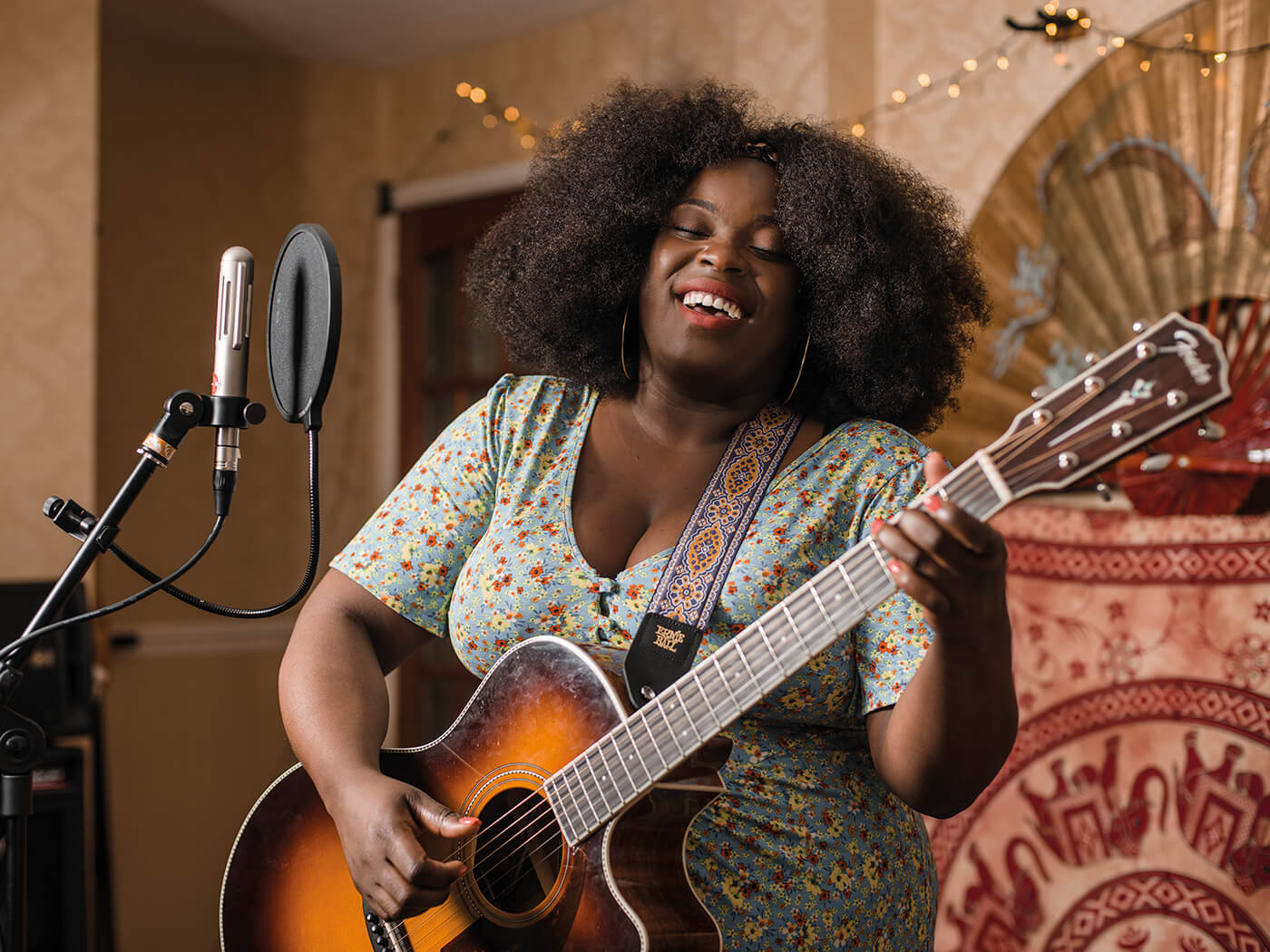
All images: Eleanor Jane
“Birth! The birth canal motivated me to start singing!” Yola – aka Yolanda Quartey – is a one-off, as her answer to the question ‘What first inspired you to make music?’ evidences. It’s accompanied by a booming, staccato laugh that will frequently pepper our hour-long chat in her rehearsal space in a quiet cul-de-sac just north of Bristol.
The laugh is a constant, even when the 35-year-old is getting into some of the dark places in which she’s found herself. But it never feels forced – she comes across as someone who laughs now because she’s genuinely grateful and delighted to be out of the other side. And not just out of it, but thriving – creatively fulfilled for the first time ever, having just made her debut album with Dan Auerbach. But anyway, back to the birth canal…
“I came into the planet and the second I could form any coherence of sound, singing seemed as obvious as talking,” Yola elaborates. “It’s like asking, how long have you been eating? How long have you been breathing?”
Taking risks
Yola’s voice is one that you might well have heard without even realising it – her pipes have been featured on pop hits by Katy Perry and Will Young, and EDM chart-toppers from Chase & Status and Duke Dumont… but that’s never been the music that she wanted to make.
“From about age four it dawned on me that I was weird! I was like, ‘Have you heard this song Goodbye Yellow Brick Road?’” Yola recalls. “‘Oh man, the chords, and the way they move…’ And everyone was like, ‘Wuh?!’”
Yola grew up just outside of Bristol in Portishead. Her Ghanaian father left before she was two and her mum – a psychiatric nurse who’d come over from Barbados in the 1970s – was left to keep things together as best she could, which didn’t involve encouraging her daughter’s dreams of being a musician…
“She did everything within her power to ruin my music career!” Yola exclaims. “We definitely had this classic single-parent family situation where you’re just trying to keep above water. We were always on the breadline and sometimes when it was bad, she’d go to the supermarket bins and get out-of-date stuff. And so I can understand her point of view of, ‘Why are you taking a risk?’”
I came into the planet and the second I could form any coherence of sound, singing seemed as obvious as talking
Despite her circumstances, Yola ended up attending a relatively good school (“I like to say that I thought my way into a grammar school, I definitely didn’t pay my way!”) and it was here that she was first exposed to the freedom that privilege afforded her peers.
“I was acutely aware that we weren’t like those people,” she recalls. “I couldn’t do a classics degree and then go, ‘I wonder what I’m going to do with my life?’ It was like, ‘You better have a plan! You have a plan yesterday!’
“But if I’d had that kind environment where my friends and family were like, ‘You go do your dream!’, that’s really all I would have needed. You don’t need to be rich… though obviously, being rich gets you there quicker – that’s why the music industry looks like ruddy Eton!”
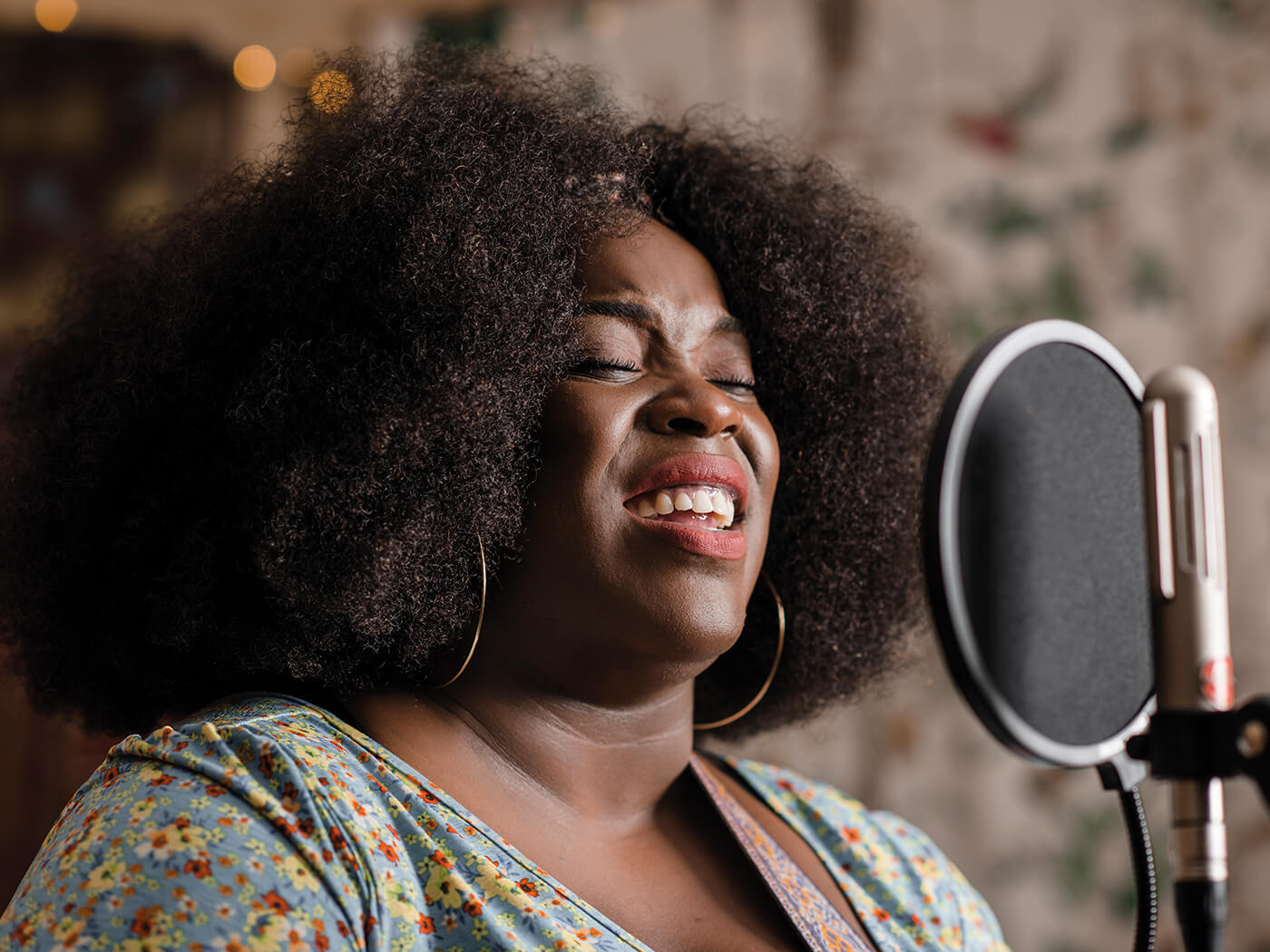
Street spirit
Yola initially headed to London for university, though it wasn’t her priority. She ended up using her student loan to keep her afloat while she tried to get work as a professional musician, but at the age of 21, circumstances collided in a most serious way.
“I became a university drop-out, because I’d spent so much time looking for work and then I found myself on the sharp end of an eviction,” she recalls. “I couldn’t pay the rent, because someone that I was living with had to leave as well. They got sick and so they had to go home, and I was like, ‘I’m really sorry for what you’re going through… but also, I’m now screwed!’’
Yola hoped the friends she’d made through music would come to her aid, but not for the last time, she was let down. “They were like, ‘Sorry, babes…’ And I’m like, ‘But you’ve known me since I was 15!?’ ‘Yeah, sorry babes, it’s not convenient,’” she recalls, the anger still understandably bubbling up. “And so I found myself on the streets for a short amount of time.”
Homelessness is weird, because you constantly have that sense of burden, you know? You feel like you owe people so much
While she wasn’t sleeping rough for long, Yola was homeless for the best part of six months, storing her stuff at friends’ houses, while sleeping on their couches and old discarded mattresses back in Bristol.
“When you’re in your 20s, your back doesn’t give a fuck, so it’s fine!” she says sardonically. “Homelessness is weird, because you constantly have that sense of burden, you know? You feel like you owe people so much. And it’s really hard to ask people for support when you know they kind of don’t give a crap.”
Despite the unbelievably tough personal situation, professionally, things were starting to happen, and Yola’s unique voice was being noticed by producers in the pop and EDM worlds. At around the same time, she also began fronting Phantom Limb, which initially seemed like a setup in which Yola could be creatively fulfilled.
“I was quite thankful for those session jobs, but I was very aware that they were jobs and it wasn’t really me being me,” she admits. “Around that time, the band started up, and I thought maybe I could put some of my kind of energy into this…”
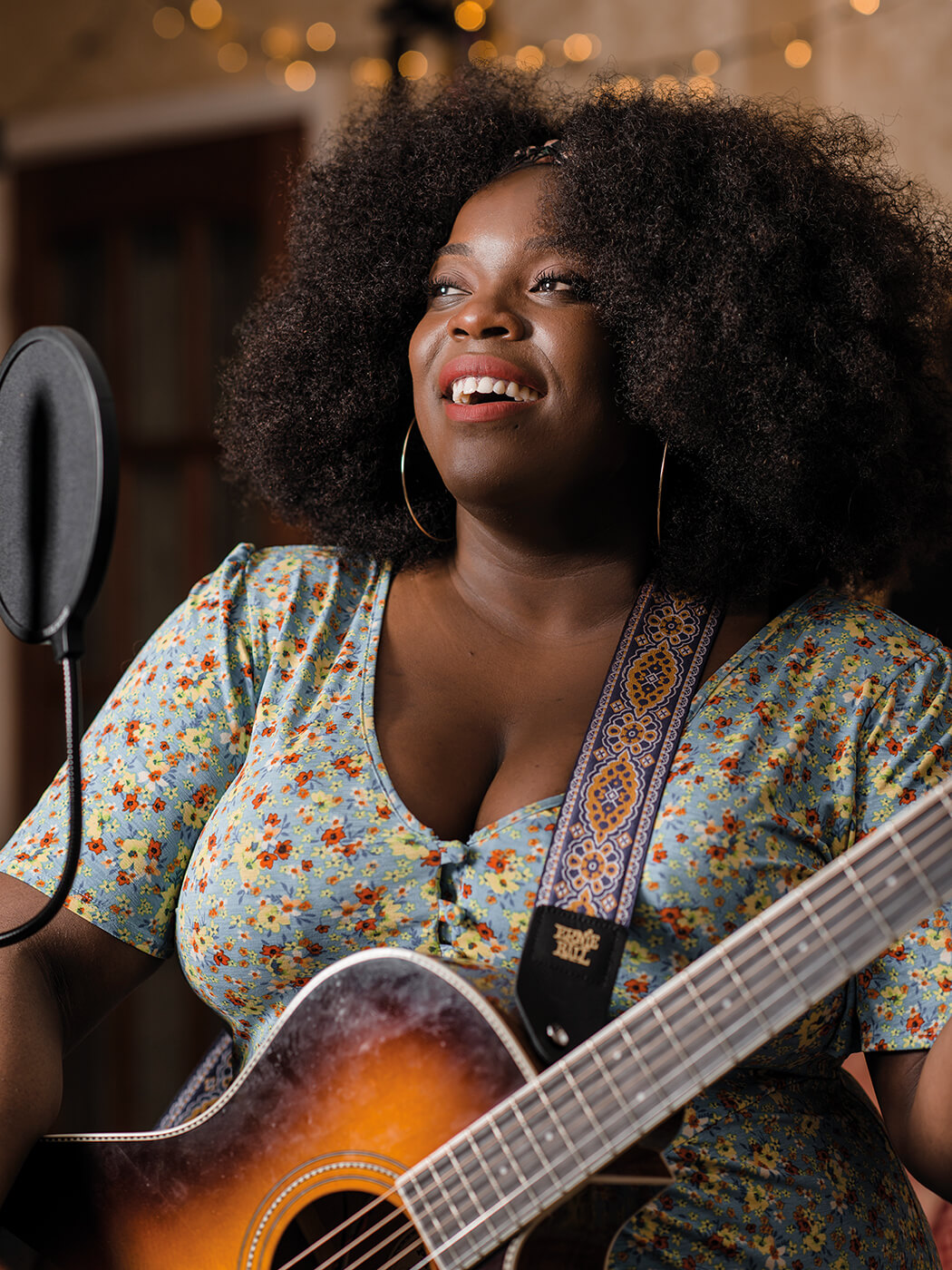
Out on a limb
On paper, Phantom Limb’s country-soul crossover sound seemed like the ideal fit for a singer who idolised Elton, Shania Twain, Dolly Parton and CSN as a child. But the longer she was in it, the more she realised that it wasn’t a healthy situation…
“It was maybe a bit too ‘bro’ an environment for me to truly permeate and self-actualise,” she explains. “Having people 10 years my senior, some of which had known me since I was 15 years old and who had a lot of control over my view of the world… it was always going to be impossible to exert your ‘self’.”
The negativity that came to define Yola’s life in the band was typified by her bandmates’ attitude when she first picked up a guitar around 2010.
“I was in an environment that was really threatened by the concept of me both having the top line and the chords!” she exclaims. “It was just like, ‘Uh, no, we don’t like this, because then what do we do?’ Which wasn’t remotely healthy at all.”
I was in an environment that was really threatened by the concept of me both having the top line and the chords!
Conversely, she was getting plenty of session and writing work in the EDM scene, where she was being encouraged to express herself creatively, but it just didn’t inspire her.
“I got to the point where it was like, I can either work with great people in the music I don’t want to do, or with awful people in the music I do want to do,” she reflects.
“And so I leave the band and then all of a sudden, the oppressive weight is off and I feel like I can write. And I can do all this stuff! And so I have like one song I write that charts in the Top 10. And then all the blinkers disappear and I think, ‘I can do what I bloody like!’
“I was just reprogramming my brain. It dawned on me that I had to learn to lead, and I’d never led anything before. And so that was the big transition really – going from being chosen to doing the choosing.”
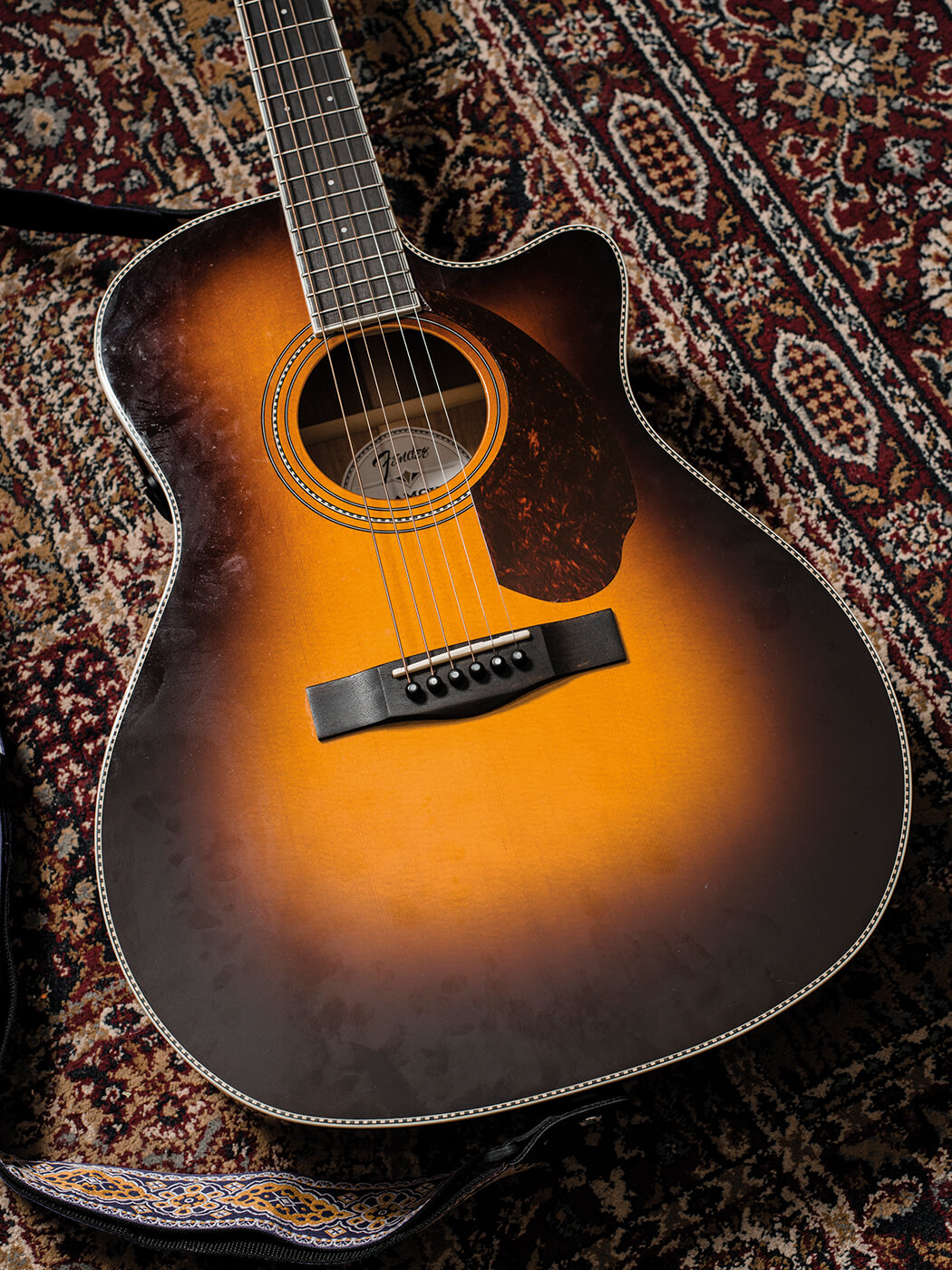
Get your privilege
The tipping point came when Yola contributed an (uncredited) vocal line for the song Won’t Look Back for DJ and producer Duke Dumont – the song had huge success in the charts on both sides of the Atlantic and gave her a level of financial security she could only have dreamed of a few years hence.
“On the PPL alone, I was golden!” she laughs. “So I was like, ‘Do I buy a house or something, or get a mortgage?’ Or… I could just throw it all at building a career, like all the frickin’ middle-class rich kids get to do because they’ve got all this time and all this frickin’ bankroll…
“So I was like, ‘I’m going to buy my own privilege!’ And that’s kind of how I got to starting out solo. It was me using the model of privilege and then pretending to be my own rich daddy!”
‘Do I buy a house or something, or get a mortgage?’ Or… I could just throw it all at building a career, like all the frickin’ middle-class rich kids get to do. So I was like, ‘I’m going to buy my own privilege!’
A key part of this next phase in Yola’s career was going back to the instrument that she’d been discouraged from in the past and using it to start to carve out her own identity as a solo artist.
“I just picked guitar up as a means to an end, because I didn’t really have anyone to collaborate with,” she explains. “I had songs in my head fully fledged and so I had to try and find a way to get them out. Because that’s the thing, you can always hear chords in your head. You can always hear progressions. But when you look down at your hands, you’re like, ‘But what can you do, though!?’
“Picking up a guitar was just this way of getting songs out of my head. And then it dawned on me that once you get over your hand feeling like a crab claw and it starts feeling like a hand again, the hump isn’t really that massive. And that just made me think, ‘Well, what was all the fuss about?!’
As primarily an acoustic player, Yola also had to find the right instrument that would be workable, settling first on a Washburn parlour guitar.
“There’s some guitars that really make you feel like you’re never going to play guitar!” she quips. “So I made sure that I had something with a friendly neck and also something that could fit underneath my rack!”
Now her go-to instrument is a Fender Paramount acoustic, which suits her kinetic style of guitar playing down to the ground.
“I hit the guitar pretty frickin’ hard, because I’m quite a rhythmic player,” Yola observes. “But with the Paramount, because of the nature of the pickups they’re using, I can hit it without getting a boatload of feedback. And it’s got a really great neck, so if you grab your F – I’m a grabber, not a barre-er – then it works. It just works for my kind of playing.”
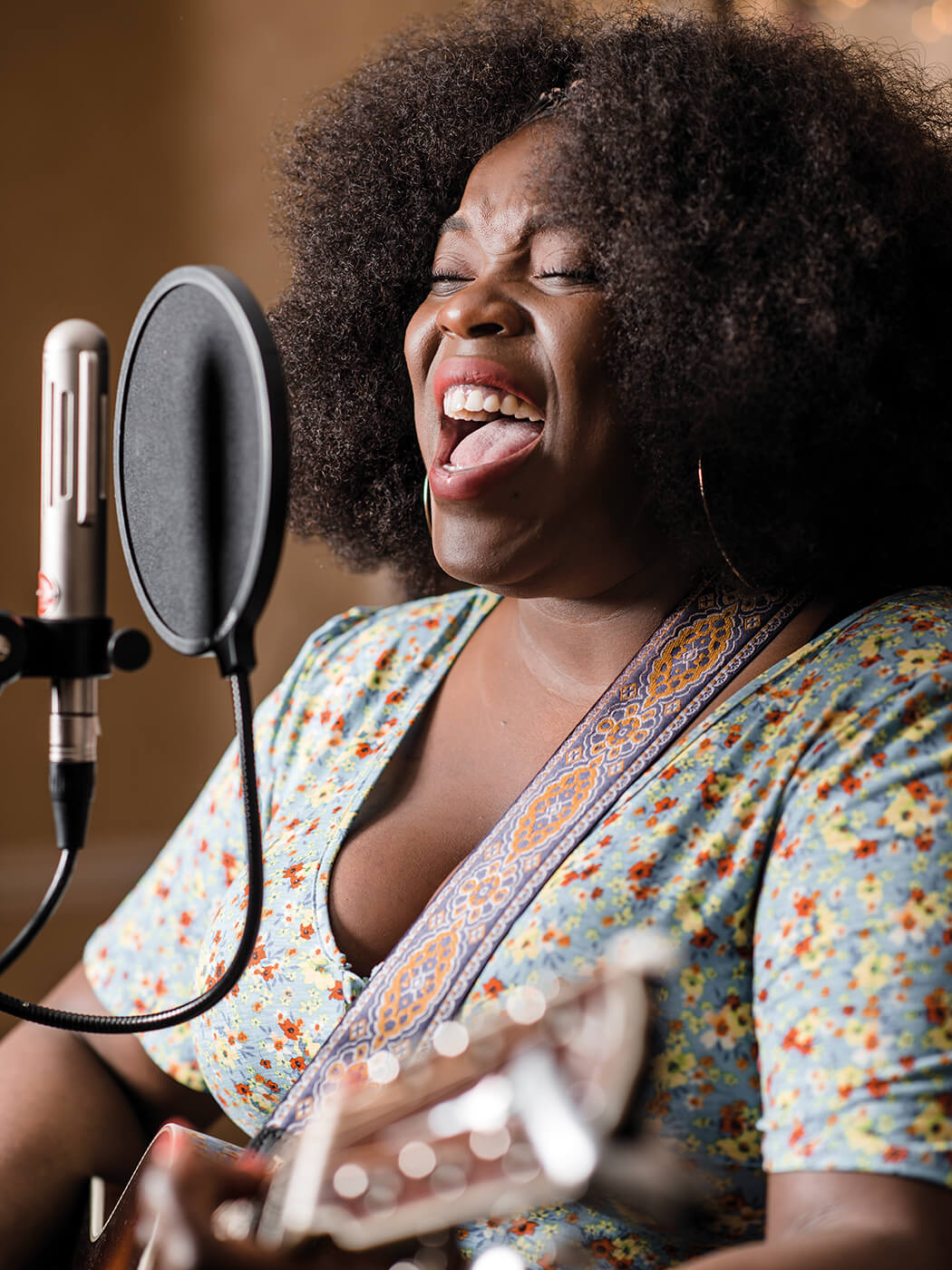
The spice of life
Yola’s tastes in music have always been broad – “my playlists were a hot mess,” she chuckles – bringing in everything from R&B and hip-hop to grunge and Britpop, with dollops of classic Americana and country thrown in for good measure.
“I was like, ‘Is there a world where all of this stuff lives together?’ In my dream world, all of it would smoosh under one loving blanket orgy of musical good times! And it dawned on me that being that eclectic as a kid was weird.”
As she got older, artists like Beck, Björk and Radiohead started bringing more esoteric music into the mainstream consciousness, but she still found that as a young black woman with a soulful voice, she was getting pigeonholed in a way that made her uncomfortable.
“I’ve always been trying to follow what feels like my path, as opposed to kind of trying to contrive or contort what I’m doing too much. It’s not like I haven’t done that, it’s just that I recognise that isn’t me.
“And that’s very hard to explain to people who hang around in environments where that’s all that black people do. But I’m more complicated! I had eclectic records like everyone else did. I did have things like hip-hop and R&B in my childhood… but my voice don’t sound like that! And so the only thing I could do was follow my voice, and see what it wanted to do.”
Dan’s the man
Where her voice wanted to go, was Nashville. Soon after deciding to focus on her solo material, Yola got involved with the UK side of the Americana Music Association and through them, earned the chance to go with some other UK-based artists to the home of country music and play showcases for some of the movers and shakers in town.
On her second pass through the city, word of Yola’s unique talent reached the ears of Dan Auerbach; the Black Keys main man knew he’d found the perfect addition to his Easy Eye Sound label.
“I had got his 2016 record and I was just listening to it thinking, ‘This sounds great… wouldn’t it be really awesome to work with him,” she recalls of the moment she got Auerbach’s call. “And then all of a sudden, ‘Bring, bring!’ And I’m like, ‘Come on, buddy, this is a bit on the nose, innit?!’”
Yola soon made her way to Nashville, and began to write with Auerbach on what would become her debut solo album. “At first it was just terrifying! Because everything that’s around you [in his studio] is just ridiculous. Just ridiculous levels of awesome. And so you’re just trying to not drink in and focus. But I knew that I just had to find that musical crossover. And how we got going was very much, ‘Okay, what are you into?’ And as much ‘What you not into?’ We definitely bonded over our loathing of 80s aesthetic!
“We probably wrote about 30 tunes in about five days – we wrote a lot! So it didn’t take long to get to the point – when you’re in the right environment, it’s like everything’s in slow motion, like you’re Neo or some shit!�”
Those songs were pared down into Walk Through Fire, a 12-track slice of sublimely vibey and authentic-sounding soul-tinged country and Americana, recorded by Yola, Auerbach and a murderers‘ row of Nashville session musicians.
The one track that she’s particularly proud of, however, is the one that didn’t have her multi-Platinum-selling co-writer in the room for – It Ain’t Easier. “I just worked up demos of songs that I had and with that one I said to him, ‘Well, here it is,’ and he’s like, ‘Yeah, that’s pretty much it!’
“Obviously, a lot more money has gone into it! But it was very interesting having the songs that we’ve written and the ones that have just flowed out of my brain and to just go, ‘Yeah, they sit perfectly happily together.’”
Fire proof
The album’s title might seem like a classic songwriter’s metaphor for overcoming the hard times that led her to the happiness and success that she’s now found, but in truth, there’s a much more visceral and remarkable story behind Walk Through Fire.
Not long after she began embarking on her solo career, the kitchen of Yola’s house caught fire, when she was inside…
“I was in shock, because I was on fire – and the thing that snapped me out of shock was thinking about the life that I’d been in previously and going, ‘Oh, that was way worse…’” she says, matter-of-factly. “And I started laughing, because your first instinct is to laugh.
“And whilst burning, it dawned on me that I’d take the life that I was building – I hadn’t even finished building it, but it was kind of taking shape and I was starting to see everything that could happen. I had some people to write with, I was starting to pick up the guitar and I could hold down a chord progression without my hand crumbling to a pile of dust. And I was like, ‘This is the beginning of something. This has potential. I feel hope for the first time in years.’
“And so I started to feel this sense of hope. It dawned on me that I’m still on fire, but I said, ‘I’ll take this now, on fire, over that life, not being on fire. It was way worse than fire. I’d happily set myself on fire right now. If the choice was that, or go back to that old life. I’m like, ‘Where’s the lighter?’”
Yola’s Walk Through Fire is out now on Easy Eye Sound/Nonesuch.

